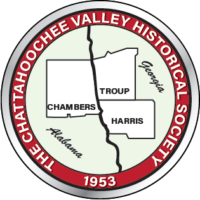Quarterly Meeting Program Descriptions
- Winter 2025 Quarterly Program
The “Lost Cause” Movement: Exploring the Mythologizing of the Confederacy and its Historical Reputation in the Post-Bellum South
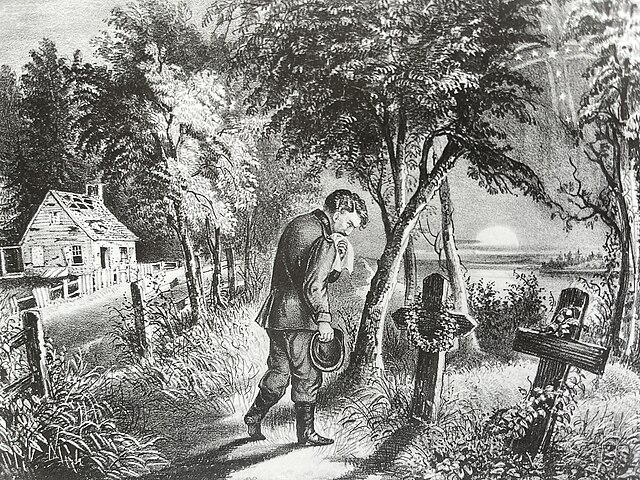
“Confederacy’s Lost Cause” Currier and Ives, 1872; Library of Congress (image from Wikimedia)
The Winter program of CVHS will be held virtually on January 26th, at 3:00 PM (EST). Our presenter, Dr. Keith Bohannon, is a longtime instructor of History at the University of West Georgia and an authority on the history of the Nineteenth Century South (both before and after the Civil War). This will be Dr. Bohannon’s second program for CVHS, the former being an in-person presentation several years ago highlighting education in Antebellum Georgia.Dr. Bohannon’s upcoming presentation will focus on what is known as the “Lost Cause of the Confederacy.” In the decades following the U.S. Civil War, many (if not most) white Southerners constructed a mythology to interpret the causes of the Civil War and reasons behind Northern victory and Confederate defeat. This movement developed during the time immediately following the Civil War known as “Reconstruction.” During this time, the post-bellum south was under Federal Military Occupation. The white population of the Southern states had to go through a process of renouncing the Confederacy in order to regain their United States Citizenship (a process that became more complicated during the Grant Administration).
In the post-war South, the white population was typically divided into two factions – the “Scalawags” (white southerners who supported Reconstruction and renounced the Confederacy) and the “Redeemers.” The latter of these two venerated the former Confederacy and sought to “redeem” the South from Union control. It is from former Confederate soldiers and officers in the latter category from which the “Lost Cause” ideology (which came to mythologize the Confederate cause) emerged. Although Reconstruction would eventually end in March of 1877, the “Lost Cause” movement (and mythology) endured far longer.
The central tenets of the Lost Cause mythology appear in inscriptions on Confederate monuments, in films such as Gone With the Wind, and in many generations of textbooks used in Southern classrooms. Lost Cause interpretations are still present in Southern society today and are often heard in debates over Confederate monuments and symbols. Although many in the southeastern United States today are not as aware of this movement, its beliefs and key arguments have permeated social and historical perspectives on the Civil War and its legacy even into the 21st Century. Dr. Bohannon’s presentation will explore and discuss this.
Dr. Keith Bohannon is a professor of history at the University of West Georgia and teaches courses in Georgia History, the Civil War and Reconstruction, and the Antebellum South. Keith is a native of Smyrna, Georgia, but his mother is a LaGrange native and has roots in Troup and Meriwether Counties dating back to the 1820s.
Join us for this very informative and interesting presentation on January 26th. To attend this virtual meeting email ccpowers02@gmail.com prior to 12:00 PM noon (EST) on Sunday, January 26th. You will then be sent the Zoom link with instructions regarding how to join the meeting.
- Fall 2024 Quarterly Program
The House Known as “Pebble Hill”
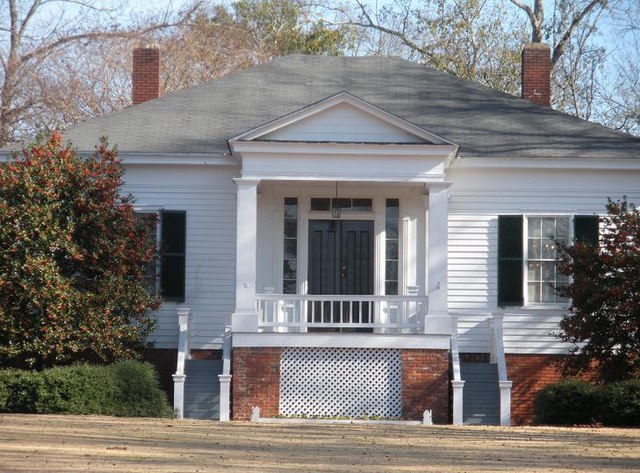
The Scott-Yarbrough House a.k.a. “Pebble Hill” in Auburn, Alabama [image Wikimedia Commons] The Fall program of CVHS will be held virtually on Sunday, October 27th, at 3:00 PM (EDT). Our presenter will be Dr. Mark Wilson from Auburn University. Dr. Wilson will be discussing the Scott-Yarborough House (known more colloquially as ‘Pebble Hill”) in Auburn, AL. The house is an 1847 Greek Revival style cottage that has become an important landmark in Auburn as well as a popular event venue. The focus of the presentation will be on the history of the house as well as many notable people associated with the house. In addition, he will note some unique artifacts in the collection that illustrate important aspects of state and local history.
The origins of the home ultimately begin with Nathaniel J. Scott and his wife Mary. They moved to East Alabama as part of the massive influx of White settlers to this area following the Second Creek War of the late 1830s. Originally moving to Macon County, they eventually relocated when Nathaniel’s own half-brother John J. Harper founded the city of Auburn (then in Macon County). They purchased the land that “Pebble Hill” would be built upon in 1846 for just $800 (which was a short distance East of downtown Auburn at the time). While continuing to own additional farmland in Auburn, they completed the construction of the house in 1847.
Because of their wealth as landed planters and their family ties to the city’s founder, the Scotts played a big role in helping establish Auburn, with Nathaniel becoming town Commissioner in 1839. Nathaniel Scott also served in State politics, representing Macon County in the Alabama State House of Representatives from 1841 to 1845, when he was elected to the State Senate. He also helped establish what would later become the Auburn Masonic Female College. In 1856, Scott and many other of his fellow Auburn Methodists established East Alabama Male College (which is what we now know as Auburn University). The Scotts remained in Auburn even after Nathaniel’s death in 1862. Following the conclusion of the Civil War and the end of slavery, Mary Scott sold the house at Pebble Hill.
The house would change owners many times from the late 1860s up until its purchase by Dr. Cecil S. Yarborough and his wife Bertha Mae Yarborough in 1912. Like the original owner, Dr. Yarborough also served in Alabama State politics for many years. He also served two terms as Mayor of Auburn, and personally welcomed President Franklin D. Roosevelt to the community upon his visit in 1939. Following his death in the 1940s, his son Clarke S. Yarborough owned the home until finally selling it in 1982. It has officially been known as the “Scott-Yarborough” house ever since, though the name “Pebble Hill” is probably what it is best known as locally.
The house is currently maintained and cared for by the Caroline Marshall Draughon Center for the Arts and Humanities, a part of the College of Liberal Arts at Auburn University. The Center maintains a digital, virtual tour of the entire house, which is located at the following link: https://my.matterport.com/show/?m=g7dppkiJq8K
In addition to history related to Pebble Hill, Dr. Wilson will discuss upcoming events at Pebble Hill which might interest CVHS members.
Dr. Mark Wilson is of the Caroline Marshall Draughon Center for the Arts & Humanities in the College of Liberal Arts at Auburn University. Originally from Saraland, Alabama, he holds degrees from the University of Mobile (B.A. Religion), McAfee School of Theology at Mercer University (Master of Divinity), and Auburn University (Ph.D. History). He is the author of William Owen Carver’s Controversies in the Baptist South (Mercer University), co-author of Living Democracy: Students as Citizens, Communities as Classrooms (Kettering Foundation Press) and several articles. In 2018, he was voted by students at Auburn University to deliver the “Final Lecture,” an award coordinated by the Student Government Association. He is a past recipient of the David Mathews Center for Civic Life’s Jean O’Connor-Snyder Award.
Join us for this very informative and interesting presentation on October 27th. To attend this virtual meeting email ccpowers02@gmail.com prior to 12:00 PM noon (EDT) on Sunday, October 27th. You will then be sent the Zoom link with instructions regarding how to join the meeting. - Summer 2024 Quarterly Program
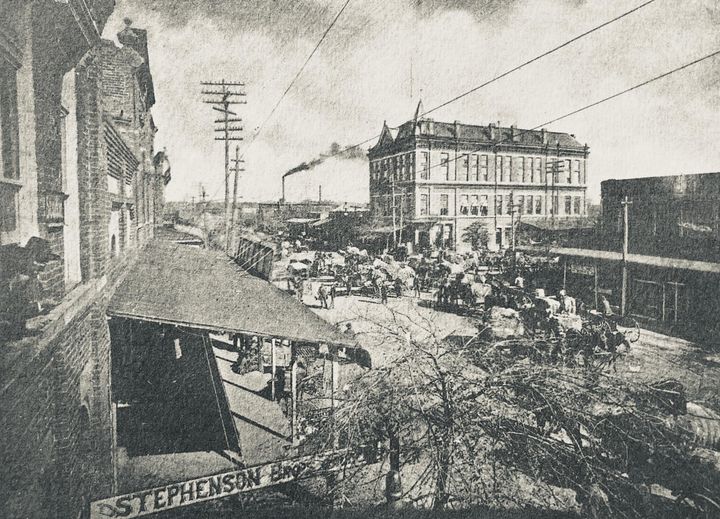
A glimpse of West Point in 1900: (photo from 1901, This Was Our Valley)
From the Historic West Point & the Chattahoochee Valley Facebook PageWest Point on the Chattahoochee
We love to hear from our members, and over the past few years several members have expressed a desire to return to in-person meetings. Virtual meetings were a necessity during the Covid period and even afterwards due to the loss of our traditional meeting arrangement with the Bradshaw Library.
On Saturday morning, July 27, CVHS will host a very different kind of quarterly program at the West Point outdoor riverside pavilion, located directly south of City Hall. CVHS President Jason Williams, VOICE Editor Ron Williams, and fellow board member Malinda Powers will present the program on this small city’s remarkable history.
Archaeological evidence suggests Native Americans were here as early as the Archaic period during the time of “hunter-gatherers.” Shallow shoals just a mile or so upriver provided excellent fishing and, more importantly, a natural river crossing enabling travel between more permanent native towns that developed. Traders made their way westward from South Carolina, followed by pioneer settlers which ultimately resulted in Indian removal westward. Early West Point residents faced many hardships and trials, but persevered. Two rail lines were conjoined in West Point, connecting the little city with two state capitals. When war came to West Point, the battle became known in the annuals of American History as “the last fort battle of the Civil War.” But like the mythical Griffith, West Point was quick to rise from its ashes and reinvent itself. The river once again played a vital role in the city’s history as it powered two new factories downstream, ultimately becoming a leading textile manufacturer in the world.
The public is invited to attend the meeting at the pavilion at 10:00 am EDT. Immediately following the program, guests are welcome to join a guided walking tour of several blocks downtown to discover the forgotten businesses that once thrived there. At the conclusion of the walking tour, guests will find a variety of downtown restaurants and eateries for lunch.
- Spring 2024 Quarterly Meeting

“Archaeology for Dummies”
The Spring program of CVHS will be held virtually on April 28th, at 3:00 PM (EDT). Our presenter will be David Johnson. Mr. Johnson is an “avocational archaeologist,” meaning that he came to practice archaeology outside of the traditional profession. In spite of not being an “official” archaeologist, he works very closely with the Alabama Archaeological Society. His area of specialty concerns the prehistoric indigenous populations of Alabama. He has published several books over the years and given many presentations throughout Alabama (and also Mississippi and elsewhere). His presentation for us will be entitled “Archaeology for Dummies” (not an insult to those in attendance, but rather a play on the title of various media that break down complex fields and concepts for unfamiliar readers).
David Johnson originally worked for the Alabama Department of Transportation. The discovery of prehistoric artifacts on his private property, however, led him to become fascinated by the field of archaeology. Realizing that he, a layperson with no previous experience or training in archaeology, was ill-equipped or prepared to handle these artifacts properly, he consulted local professional archaeologists. They showed him the proper ways of cataloging and recording their discoveries for the purposes of preservation and education. Through working with them (and learning how they carried out their practice), David became personally enraptured in the world of amateur (or as he calls it, “avocational”) archaeology. He began to realize that others like him (with no previous archaeological training or expertise) would need the same know-how and assistance should they also discover prehistoric artifacts. While continuing his work with ALDOT, he also began sharing this newfound passion with other “lay people.”
David has authored many books, most notably the Handbook for Alabama’s Prehistoric Indians and Artifacts (Borgo Press, 2019). This work also saw contributions from many of the professional archaeologists in the Alabama Archaeological Society. The work contains many full-scale photographs, geographic distribution charts, and detailed descriptions of various artifacts (such as prehistoric projectile points). Due to the popularity of the book in Alabama, he was also asked to publish a similar catalogue for Mississippi as well (which he will be discussing in his presentation, as it has recently been published).
Retired from the Alabama Department of Transportation, David and his wife April volunteer working with different archaeological projects and providing educational presentations to schools and other groups regarding archaeology and prehistory. He is also currently working with many Native American groups to help preserve various Native archaeological sites on Chandler Mountain in St. Claire County, AL from local developers’ plans to create a massive dam project.
Our virtual presentation will last approximately one hour (with David’s power points lasting approximately 45 to 50 minutes). The presentation will expound upon his work on the two archaeological works (for Alabama and Mississippi) as well as an overview of how “avocational” archaeological enthusiasts can participate and experience the world of archaeology in an official, responsible manner (respectful of the cultures and peoples whose artifacts are being discovered). His is a tale that exemplifies the potential that exists when professional archeologists endeavor to include ordinary lay people through educating and mentoring nonprofessionals.
Join us for this very informative and interesting presentation on April 28th. To attend this virtual meeting email ccpowers02@gmail.com prior to 12:00 PM noon (EDT) on Sunday, April 28th. You will then be sent the Zoom link with instructions regarding how to join the meeting.
- Winter 2024 Quarterly Meeting
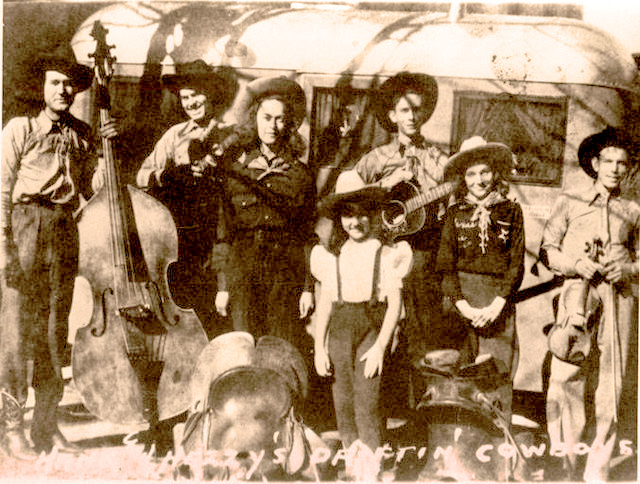
A Sister’s Love: Legacy of Hank Williams and His Sister Irene
The Winter program of CVHS will be held virtually on January 28th, at 3:00 PM (EDT). Our presenter, Dr. Steve Goodson, is a longtime instructor of History at the University of West Georgia (having recently just retired) and an authority on the history of Country Music in the Deep South. This will be Dr. Goodson’s third program for CVHS, the former highlighting the life and music of Hank Williams, Jr.
“It is the story of Hank’s older sister Irene,” says Goodson. “Irene played an important but underappreciated role in protecting and promoting Hank’s reputation and legacy in the decades following his death in 1953.” Both Irene and Hank were born in Butler County, Alabama in the early 1920s. Their father Elonzo “Lon” Williams was a former Railroad Engineer for W.T. Smith Lumber Co. before serving (and suffering injuries) in World War I. Following the death of Ernest Williams two days after his birth in 1921, Irene became the oldest child of the Williams family. For this reason, perhaps, she took on a more protective role in the upbringing of her younger siblings. This applied to Hank, who struggled with Spina Bifida (a painful spinal condition) during his childhood (and later).
This presentation will highlight many of the hardships the Williams family endured during Irene and Hank’s childhood. All of this heavily influenced Hank’s musical career. Regarding Irene’s role in Hank’s career and legacy, Goodson feels that her story is very much a part of Hank’s own story (both before and after his death). He feels it is essential to all who wish to learn more about the Alabama-born Country legend.
Steve Goodson was born in Montgomery, Alabama, and grew up in nearby Prattville. He received his B.A. in History from Auburn University at Montgomery in 1988 and earned his Ph.D. in History from Emory University in 1995. He joined the faculty at the University of West Georgia, where he served as a professor (and for twelve years as department chair) until retiring just last month. His book Highbrows, Hillbillies, and Hellfire: Public Entertainment in Atlanta, 1880-1930, published by the University of Georgia Press, won the Georgia Historical Society’s Bell Award as the best book on Georgia History published in 2002. He is also co-editor of The Hank Williams Reader, which was published in 2014 by the Oxford University Press. This work has received much critical acclaim as a detailed account of Williams’ life and career.
Join us for this very informative and interesting presentation on January 28th. To attend this virtual meeting email ccpowers02@gmail.com prior to 12:00 PM noon (EDT) on Sunday, January 28th. You will then be sent the Zoom link with instructions regarding how to join the meeting. - Fall 2023 Quarterly Meeting
The People Behind “Syrup Soppin’ Day” – Lee County Historical Society
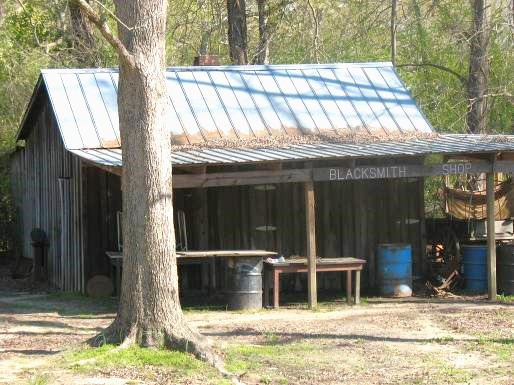
The Blacksmith Shop at Pioneer Park was built in the mid 1980s in cooperation with the local chapter of the Alabama Forge Council. Photo from leecountyhistoricalsociety.org. The Chattahoochee Valley Historical Society would once again like to extend an open invitation to attend one of our fine quarterly presentations on Sunday, October 22nd at 3:00 PM EST (2:00 PM CDT). Our presentation will once again be a live, on-site presentation held at Point University’s main campus, the Lanier Academic Center, in downtown West Point, GA. Our presenter for this upcoming meeting will be Dr. Jim Witte. Dr. Witte’s presentation will focus on the history and annual programs and events of the Lee County Historical Society (particularly “Syrup Soppin’ Day” in Loachapoka, where he has served as the Blacksmith for the past 20 years).
The well-known annual “Syrup Soppin’ Day” in Loachapoka, AL goes back to 1971. At a location in downtown Loachapoka, the historical process of harvesting Sugar Cane is recreated each year. This process, involving 19th century farming techniques including a mule, produces buckets of sweet, delicious cane syrup. As the annual festival grew, it also became a place for many local vendors to come and shop their wares for the residents of East Alabama.
Directly across Alabama State Route 14 from all of the vendors and the railroad tracks, one can also find “Pioneer Park”. This is where, on one specific Saturday every Fall, the Lee County Historical Society bring the past to life. The Society’s museum properties are open to the public (complete with all of their exhibits) and many live demonstrations by
historical re-enactors (like our speaker, Dr. Witte, who is the Blacksmith) take us back in time to the 19th century. Since Loachapoka was once a Creek settlement (meaning “place of the turtles” in Muscogee), there are also members of their community giving demonstrations of their lives and lifestyles as well.Dr. Witte, with over 60 years of combined military and civilian flight experience, is quite an accomplished individual. A former Army Officer and pilot, he has experience with both U.S. military rotary-wing and fixed-wing aircraft. With a PhD from the University of South Florida, he has been at Auburn University in various capacities in the past 25 years. For the past four years, he has been the Director (and Professor of Aviation Management) for the Auburn School of Aviation. Dr. Witte spent extensive time in industrial training, developing programs of instruction ranging from sexual harassment, loss control management, Supervisor’s safety development, methods, and techniques of training, and Office of Safety and Health Administration (OSHA) compliance training. Additionally, He is an award winning bladesmith and blacksmith instructor.
This presentation will be held at Point University in West Point, GA (address: 507 W 10th Street, West Point, GA, 31833). Visitors are encouraged to park in the west parking lot and enter through the western entrance to the building (several CVHS members will be there to help them find their way to the presentation room). The presentation will start at 3:00 PM Eastern (2:00 PM Central) on Sunday, October 22nd and will last approximately one hour (with time for questions at the end). If anyone has any questions concerning our presentation, please email our Program Chair Charlie Powers at ccpowers02@gmail.com for further information.
- Summer 2023 Quarterly Meeting
A Home with a History – McRitchie-Hollis Home
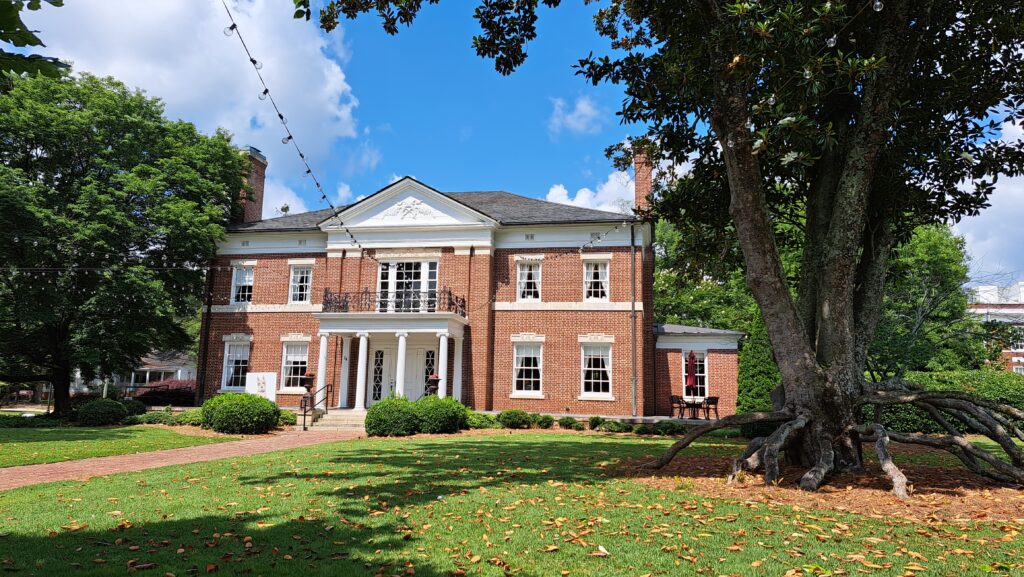
The McRitchie-Hollis Home, Newnan, GA Every house (and every home) has a history—each with its own stories, memories, and legacy of those who once lived there. Many homes also reflect the history of the community in which they live. One home that encompasses an abundantly rich history of both its many residents and its community can be found at 74 Jackson Street in Newnan, GA. This 1937 Neoclassical house has such a rich history that it has served as a museum (and home base for the Newnan-Coweta Historical Society) since 2013.
Before you go, or if you are unable to, you certainly will want to join us for an online discussion about this wonderful museum. The McRitchie-Hollis Museum will be the focus of our quarterly presentation on Sunday, July 23rd, 2023, at 3:00 PM EDT (2:00 PM CDT). This virtual presentation (once again on Zoom) will feature the director of the museum. Our presenter, Ms. Larisa Scott, NCHS Exec. Director, will share the history of NCHS and the future of the museum and other NCHS services.
The Newnan-Coweta Historical Society is a non-profit over 50 years old. Originally housed in the Male Academy Museum, the organization’s home base is now the McRitchie-Hollis Museum. Located near downtown Newnan, the museum is undergoing a major transformation. Once owned by Ellis and Mildred Peniston, members of a prominent mill family, later became the hospital auxiliary offices before becoming a museum. It still houses many of the Peniston’s former belongings (and even has their family kitchen preserved in its original state).
There are also many relics from Newnan itself on display. In the Peniston’s former dining room, one can find preserved wooden blocks that once lined the streets of Newnan’s picturesque Courthouse Square. In the adjacent room, one can find the Museum’s “meet the locals” exhibit featuring local Newnan-born figures (such as Country music legend Alan Jackson). Also, there is an exhibit dedicated to the infamous “Murder in Coweta County” (a 1948 court case notable for a White defendant, wealthy and powerful John Wallace, being convicted by the testimony of two Black laborers). This infamous case became memorialized in a 1976 book by Margaret Anne Barnes (and later as a 1983 television film starring Andy Griffith and Johnny Cash).
In another room, there is an exhibit on one of Newnan’s most notable residents: former Governor Ellis G. Arnall. Elected in 1943, Ellis Arnall was notable during his day for his opposition to the Poll Tax, White Supremacy, and the prominence and influence of the Ku Klux Klan. Unfortunately, his opposition to such things cost him his re-election bid in 1947 to Herman Talmadge. Interestingly enough, Talmadge died soon after the election, igniting what became the infamous “Three Governors Controversy”. Ellis passed away in 1989 and is buried in Oak Hill Cemetery, just across the street from the Museum itself.
Our presenter, Ms. Scott, is a Georgia native and Newnan resident for 25 years. She is very passionate about history, storytelling, education and preservation. She looks forward to sharing the history of NCHS and the museum, plus future plans.
Join us for this very informative and interesting presentation on July 23rd. To attend this virtual meeting email ccpowers02@gmail.com prior to 12:00 PM noon (EDT) on Sunday, July 23rd. You will then be sent the Zoom link with instructions regarding how to join the meeting.
- Spring 2023 Quarterly Meeting
History Close to Home:
The Museum of East Alabama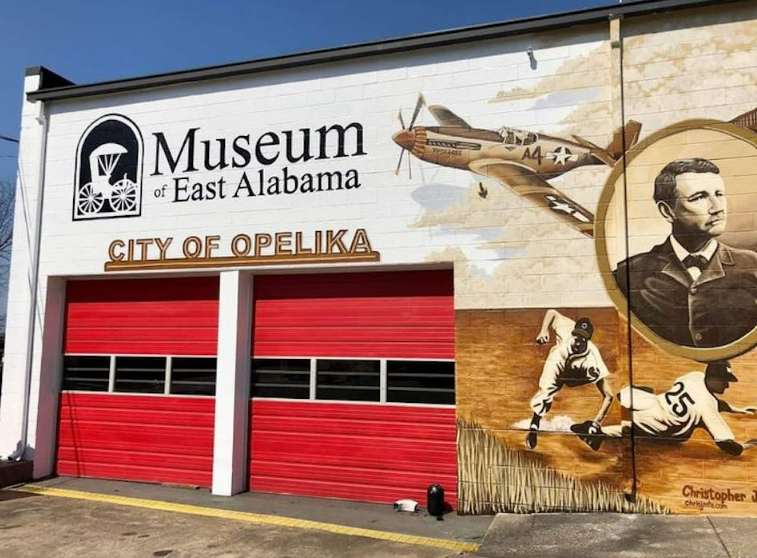
Are you a resident of East Alabama? Did you grow up there? If not, have you ever visited the region? It is a region with a rather complex history and a richness of stories and other trappings of days long gone. Fortunately, though, there is a place where this is made easier (and wonderfully presentable). This place, of course, is the Museum of East Alabama in Opelika, AL.
Please join us for a discussion on this wonderful museum on Sunday, April 23rd, 2023, at 2:00 PM CDT (3:00 PM EDT) for our quarterly presentation. This virtual presentation (once again on Zoom) will feature the director of the museum. Our presenter, Mr. Glenn Buxton, has been the official director of the Museum of East Alabama since he retired from a long broadcasting career in 2006. He will be discussing the various exhibits and services that the Museum of East Alabama currently provides.
The Museum of East Alabama was first open to the public in 1989. It occupies the site of the former Clement Hotel on 121 South St. in downtown Opelika, AL. It is open to the public, free of charge, from 10 AM to 4 PM Tuesdays through Fridays. The museum has an impressive collection of artifacts and exhibits on display detailing the history of this region from pre-Columbian times up until the present day.
The Museum currently has two main exhibition halls, the one adjacent to the main room being reserved for the history of Alabama’s Native peoples. These exhibits cover a wide variety of historical periods of Native history in Alabama. Its oldest (and most well-known) artifact on display is a canoe used by the “Eastern Woodland” culture in 3500 B.C. The canoe was originally unearthed in northwestern Florida, but used by the same Eastern Woodland peoples who inhabited what is now East Alabama during the same time period. They have many other artifacts from both ancient and more “recent” Native inhabitants of Alabama. These artifacts include projectile artifacts (“arrowheads”), pottery, jewelry and ceremonial wear, and more. The most “recent” Native exhibit is a pair of Muscogee women’s legging (a ceremonial outfit) going back to the early 1840s.
There are many other interesting exhibits on display, such as several clothing exhibits spanning back 200 years. One of the more interesting of these is a collection of wedding gowns worn by women of the region throughout various decades of the 20th century (from the 1920s up until the 1950s). There are some very interesting “war-time” exhibits covering the “spoils of war” from World War II. One of the most notable are the collection of Samurai swords (formerly owned by officers in the Japanese Imperial Forces) confiscated by U.S. servicemen native to Lee County during the war. As one can also probably imagine, there are many exhibits focusing on the Industrial history of this region (including machinery and other exhibits from the various cotton mills that once employed the majority of East Alabama’s work force). The most recent display is an exhibit on the unfortunate history of lynchings and extrajudicial killings that African-Americans often endured in Alabama from the Reconstruction era up until the late 20th century. Part of the larger “remembrance project” based out of Montgomery, this exhibit was largely curated and produced by the History Department at Auburn University.
Join us for this very informative and interesting presentation on April 23rd. To attend this virtual meeting email ccpowers02@gmail.com prior to 12:00 PM noon (EDT) on Sunday, April 23rd. You will then be sent the Zoom link with instructions regarding how to join the meeting.
- Winter 2023 Quarterly Meeting
Historic West Point and Chattahoochee Valley:
A Facebook Page Devoted to “Valley History”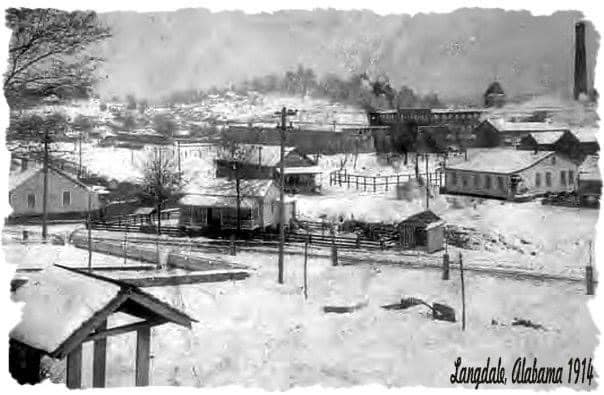
This 1914 photo of a snow-covered Langdale Village was recently shared on the Historic West Point & the Chattahoochee Valley Facebook page. Greetings. The Chattahoochee Valley Historical Society would like to extend a warm welcome to the public to attend our (virtual) quarterly meeting on Sunday, January 22nd, at 2:00 PM Central (3:00 PM Eastern). This meeting, like our previous meetings for all of 2022, will be held virtually on Zoom. Our presentation will be headed up by two presenters: Jerry Ledbetter of West Point, GA, and Eddie Lanier of Lanett, AL. Both men will be discussing their popular Facebook page Historic West Point and the Chattahoochee Valley.
Historic West Point and the Chattahoochee Valley is a Facebook page/site committed to sharing the history of the Greater Valley Area with those who have lived here forever and those who are just now calling “The Valley” home. This page was created by Jerry Ledbetter and Eddie Lanier and has experienced thousands of views as more and more people seem genuinely interested in the story of our community.
Jerry Ledbetter is originally from Lanett, AL, and currently resides in West Point, GA. He has been an ordained minister for over 30 years (20 of those years as the pastor of the West Point Presbyterian Church). Jerry has authored three books, including The Church of the Covenant: A History of the West Point Presbyterian Church in 2012 (for the church’s 175th Anniversary). He is also in his third term on the West Point City Council and is deeply involved in the community. In his own words, Jerry describes himself as “a history nerd,” and finds enjoyment in all things historic. He loves visiting historic sites and learning about historic buildings. He is most fascinated by the connection between community history and church history.
Eddie Lanier is originally from the community of Eclectic in Elmore County, Alabama. Eddie moved to West Point/Lanett when he began his 46-year career with “The Company.” He and his wife, Anita, reared their family here, truly making the area home. Eddie is actively involved in the community, serving on various boards including serving as the Chairperson of the Board of Directors for the New Horizon Community Theatre and as the treasurer of the West Point Lions Club. He is also very active in his church, First United Methodist of West Point, singing in the choir and taking part in various other ministries.
Join us for this very informative and interesting presentation on January 22nd. To attend this virtual meeting email ccpowers02@gmail.com prior to 12:00 PM noon (EDT) on Sunday, January 22nd. You will then be sent the Zoom link with instructions regarding how to join the meeting.
- Fall 2022 Quarterly Meeting
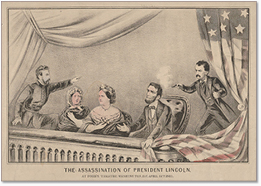
Assassination of President Lincoln The Fall program of CVHS will be held virtually on October 24th, at 3:00 PM (EDT). Our presenter, Mr. Jim Baggett, is the Head of the Department of Archives and Manuscripts at the Birmingham Public Library and Archivist for the City of Birmingham. His presentation for our October program will focus on John Wilkes Booth, the infamous assassin of President Abraham Lincoln, and his time spent in the State of Alabama before April of 1865.
Prior to his infamy as America’s first Presidential assassin, John Wilkes Booth was a well-renowned star of the American stage of the 19th century. Born into the celebrated Booth family of actors from Maryland, he and his brother Edwin Booth were known throughout the United States in the late 1850s and early war years. The family traveled all throughout the country, and this included the states of the soon-to-be Confederacy in 1860. Booth is known to have visited Alabama one time. In the fall of 1860, he spent six weeks in Montgomery performing to packed audiences as Romeo, Hamlet, and Richard III. During that time, he witnessed and took part in Alabama’s debates on secession. According to some accounts, Booth was chased out of Montgomery for expressing a strong allegiance to the Union (which is ironic given his later infamy in the northern states for supporting the Confederacy and eventual role as assassin).
While much of Mr. Baggett’s presentation will focus on his actual visit to Alabama, it will also explore a “legend” concerning Booth returning to Alabama after the war (and his subsequent death). In the years that followed Lincoln’s assassination, Booth allegedly revisited Alabama (if only in spirit). Baggett will talk about a legend, originating from one of his former lovers, that Booth did not actually die in 1865, but lived on and traveled to many places. A part of the upcoming presentation will focus on one of his “post-humous journeys” to the State of Alabama in the years following the end of the war.
Jim Baggett currently serves as the President of the Alabama Historical Association (previously serving as President of the Society of Alabama Archivists). He originally graduated from the University of Alabama at Birmingham in 1986 with a B.A. in History and has since earned two M.A.s in History (the most recent from the University of Alabama in 1997). Jim has lectured throughout the U.S. and in Europe and has been featured on Alabama Public Television, Alabama Public Radio, National Public Radio, and C-SPAN. He has authored two books on Alabama history, edited three others, and has written dozens of articles for various magazines such as The Alabama Review (among others). He also writes the “Reading Birmingham” book column for the online news site BirminghamWatch. Jim lives with his wife and daughter in Birmingham and Mentone, Alabama.
Join us for this very informative and interesting presentation on October 24th. To attend this virtual meeting email ccpowers02@gmail.com prior to 12:00 PM noon (EDT) on Sunday, October 24th. You will then be sent the Zoom link with instructions regarding how to join the meeting.
- Summer 2022 Quarterly Meeting
Forgotten Alabama
Presenter Glenn Wills
The Summer program of CVHS will be held virtually on July 24th, at 3:00 PM (EDT). Our presenter will be Glenn Wills. Mr. Wills is one of the founding administrators of the Facebook page “Forgotten AlabamaTM”. This page was purposefully created for Facebook users to post photographs of various places in the State of Alabama that are now in states of disrepair or neglect. “Forgotten AlabamaTM” is one of the largest, most interactive pages of its kind on Facebook, with over 284,600 members as of June 2022.
While born out of state, Glenn Wills has spent nearly all his life in Alabama (his mother being a native of Lee County). He grew up in Huntsville, AL, attending S.R. Butler High School and later graduating from the University of Alabama at Huntsville. He then went on to work in the media industry in Birmingham (originally as a part-time tape editor and later a videographer). Eventually, he was hired by the local NBC-affiliate in Birmingham, Alabama, as a satellite truck engineer. As these trucks frequently traveled throughout the state, Glenn spent a lot of time getting acquainted with the architecture and scenery of the entire state (both rural and urban areas). It was his appreciation and concern for the many dilapidated and neglected buildings that he encountered in these travels that gave him the idea to create a Facebook page to encourage their restoration, preservation, and appreciation.
The page that is now “Forgotten AlabamaTM” was originally founded as a “fan page” in 2013. By September of 2014, however, Wills modified it to a “group page”, which now anyone on Facebook can join. The page currently has over 284,600 members (as of mid-June 2020). It is the largest Facebook group of its genre in the entire United States. The page has a group of administrators who oversee membership and review all submitted posts. Users can upload pictures of any ruined or neglected historical landmark in Alabama (pending administrator approval).
In addition to his management of the Facebook page, Mr. Wills is also the author of several books. His published books (in order) include Forgotten Alabama (Strange Wonderful Bird Press, 2016), More Forgotten Alabama (Strange Wonderful Bird Press, 2017 OoS), and 200 Years of Forgotten Alabama (Blue Rooster Press, 2019). He is currently finishing a fourth book entitled Finding Forgotten Alabama, to be released by Blue Rooster Press in August of this year.
Our virtual presentation will last approximately one hour (with Glenn’s power points lasting approximately 45 to 50 minutes). He often presents to different groups and organizations throughout Alabama and usually focuses specifically on the area in which he is presenting. For this presentation, Glenn is especially knowledgeable about this area. His mother is an Auburn native, and much of her family came from Lee and Chambers County.
Join us for this very informative and interesting presentation on July 24th.
To attend this virtual meeting email ccpowers02@gmail.com prior to 12:00 PM noon (EDT) on Sunday, July 24th. You will then be sent the Zoom link with instructions regarding how to join the meeting.
- Spring 2022 Quarterly Meeting
Before Nashville: Atlanta and the Origins of Country Music
Presenter Dr. Steve Goodson
The Spring program of CVHS will be held virtually on April 24th, at 3:00 PM (EDT). Our presenter, Dr. Steve Goodson, is a longtime instructor of History at the University of West Georgia and an authority on the history of Country Music in the Deep South. This will be Dr. Goodson’s second program for CVHS, the former highlighting the life and music of Hank Williams, Jr.
“It’s the story of how Atlanta became the nation’s main country-music recording center in the 1920s”, says Goodson. The presentation will further examine how it lost that position to Nashville in later decades. According to Goodson, this story has three main characters. First is colorful late-nineteenth and early twentieth-century Atlanta itself. Second is Ralph Peer, an influential A&R (Artists and Repertoire) man for the Okeh record label. And the third is Fiddlin’ John Carson, who recorded the first country hit in Atlanta in 1923.
Dr. Goodson’s presentation will also include a discussion of the former property at 152 Nassau Street in Atlanta. This was once the site of the recording studio where many of these country music artists recorded their music. Unfortunately, that historic site was demolished several years ago so that developers in Atlanta could build a new location for Jimmy Buffett’s Margaritaville Hotel and Restaurant. There was a lengthy, but ultimately unsuccessful, battle to prevent the demolition of 152 Nassau Street. Dr. Goodson was fortunate enough, however, to be able to personally visit this location before the demolition took place.
Steve Goodson was born in Montgomery, Alabama, and grew up in nearby Prattville. He received his B.A. in History from Auburn University at Montgomery in 1988 and earned his Ph.D. in History from Emory University in 1995. He joined the faculty at the University of West Georgia, where he is a full professor and served twelve years as department chair.
His book Highbrows, Hillbillies, and Hellfire: Public Entertainment in Atlanta, 1880-1930, published by the University of Georgia Press, won the Georgia Historical Society’s Bell Award as the best book on Georgia History published in 2002. He is also co-editor of The Hank Williams Reader, which was published in 2014 by the Oxford University Press. This work has received much critical acclaim as a detailed account of Williams’ life and career.
Join us for this very informative and interesting presentation on April 24th. To attend this virtual meeting email ccpowers02@gmail.com prior to 12:00 PM noon (EDT) on Sunday, April 24th. You will then be sent the Zoom link with instructions regarding how to join the meeting.
The Summer program of CVHS will be held virtually on July 24th, at 3:00 PM (EDT). Our presenter will be Glenn Wills. Mr. Wills is one of the founding administrators of the Facebook page “Forgotten AlabamaTM”. This page was purposefully created for Facebook users to post photographs of various places in the State of Alabama that are now in states of disrepair or neglect. “Forgotten AlabamaTM” is one of the largest, most interactive pages of its kind on Facebook, with over 284,600 members as of June 2022.
While born out of state, Glenn Wills has spent nearly all his life in Alabama (his mother being a native of Lee County). He grew up in Huntsville, AL, attending S.R. Butler High School and later graduating from the University of Alabama at Huntsville. He then went on to work in the media industry in Birmingham (originally as a part-time tape editor and later a videographer). Eventually, he was hired by the local NBC-affiliate in Birmingham, Alabama, as a satellite truck engineer. As these trucks frequently traveled throughout the state, Glenn spent a lot of time getting acquainted with the architecture and scenery of the entire state (both rural and urban areas). It was his appreciation and concern for the many dilapidated and neglected buildings that he encountered in these travels that gave him the idea to create a Facebook page to encourage their restoration, preservation, and appreciation.
The page that is now “Forgotten AlabamaTM” was originally founded as a “fan page” in 2013. By September of 2014, however, Wills modified it to a “group page”, which now anyone on Facebook can join. The page currently has over 284,600 members (as of mid-June 2020). It is the largest Facebook group of its genre in the entire United States. The page has a group of administrators who oversee membership and review all submitted posts. Users can upload pictures of any ruined or neglected historical landmark in Alabama (pending administrator approval).
In addition to his management of the Facebook page, Mr. Wills is also the author of several books. His published books (in order) include Forgotten Alabama (Strange Wonderful Bird Press, 2016), More Forgotten Alabama (Strange Wonderful Bird Press, 2017 OoS), and 200 Years of Forgotten Alabama (Blue Rooster Press, 2019). He is currently finishing a fourth book entitled Finding Forgotten Alabama, to be released by Blue Rooster Press in August of this year.
Our virtual presentation will last approximately one hour (with Glenn’s power points lasting approximately 45 to 50 minutes). He often presents to different groups and organizations throughout Alabama and usually focuses specifically on the area in which he is presenting. For this presentation, Glenn is especially knowledgeable about this area. His mother is an Auburn native, and much of her family came from Lee and Chambers County.
Join us for this very informative and interesting presentation on July 24th.
To attend this virtual meeting email ccpowers02@gmail.com prior to 12:00 PM noon (EDT) on Sunday, July 24th. You will then be sent the Zoom link with instructions regarding how to join the meeting. - Winter 2022 Quarterly Meeting
Florida, the Fourteenth Colony
Presenter Mr. Mike Bunn
Greetings. The Chattahoochee Valley Historical Society would like to extend a invitation to the public to virtually attend our quarterly meeting on Zoom on Sunday, January 23rd, at 2:00 PM Central (3:00 PM Eastern). Our presenter will be Mr. Mike Bunn, a historian and author of several noteworthy books. His presentation concerns the history of Florida from the mid-18th Century up until the Adams-Onis Treaty made it a U.S. State in 1819.
Unlike our previous two quarterly meetings, which were in-seat at Point University, this meeting will be attended virtually on Zoom. If you are interested in attending this virtual meeting, email ccpowers02@gmail.com for the relevant Zoom information prior to 12:00 PM noon (CDT) on Sunday, January 23rd. You will then be sent the Zoom link (which you should simply be able to click on) and additional information (should you need it) and instructions. It would be best to log on 15 minutes before the presentation begins at 2:00 PM (Central).
Mr. Bunn has a very interesting presentation for this Sunday afternoon. The focus of his presentation is what we now know as the State of Florida. Most people know that Florida was once a Spanish colony prior to becoming a U.S. State. The city of St. Augustine is, in fact, the first permanent European settlement in North America. What few people know, however, is that ownership of Florida changed hands several times between the 1740s and 1819, with the British taking possession. Under a brief period of British rule, Florida was divided up into two colonies: “British West Florida” and “British East Florida”. Many people may then wonder how “the Floridas” were left out of the American Revolution if they were “British Colonies”. Mr. Bunn’s presentation will certainly shed light on this interesting glimpse at our southernmost neighbors during the Revolutionary period (and whether or not they were really “left out” at all, or simply overlooked or even forgotten).
Much of the focus of Mr. Bunn’s presentation is the British colony of West Florida. This colony once stretched from the mighty Mississippi to the shallow bends of the Apalachicola and portions of what are now the states of Florida, Alabama, Mississippi, and Louisiana. It is (arguably) the forgotten fourteenth colony of America’s Revolutionary era. The colony’s eventful years as a part of the British Empire form an important and compelling interlude in Gulf Coast history that has for too long been overlooked for a host of reasons, including the fact that West Florida did not rebel against the British Government. Also, the colony has long been dismissed by many as a loyal but inconsequential fringe outpost, if even considered that at all. Nevertheless, the colony’s history showcases a tumultuous political scene featuring a halting attempt at instituting representative government; a host of bold and colorful characters; a compelling saga of struggle and perseverance in the pursuit of financial stability; and a dramatic series of battles on land and water which brought about the end of its days under the Union Jack. In Fourteenth Colony, historian Mike Bunn offers the first comprehensive history of the colony, introducing readers to the Gulf Coast’s remarkable British period and putting West Florida back in its rightful place on the map of Colonial America.
Mr. Bunn is a historian and author who has worked with several cultural heritage organizations in the Southeast. He currently serves as Director of Historic
Blakeley State Park in Spanish Fort, Alabama. He is author or co-author of several books, including Fourteenth Colony: The Forgotten Story of the Gulf South During America’s Revolutionary Era (the work that is the focus of our presentation). Other works by Mr. Bunn include:
The Assault on Fort Blakeley:
The Thunder and Lightning of Battle
Early Alabama: An Illustrated Guide to the
Formative Years, 1798-1826
Alabama From Territory to Statehood:
An Alabama Heritage Bicentennial Collection
Well Worth Stopping to See: Antebellum Columbus, Georgia Through the Eyes of Travelers
Civil War Eufaula
Battle for the Southern Frontier:
The Creek War and the War of 1812
Images of America: The Lower Chattahoochee River.If anyone would like to know more about any of these works, he has a website with much more pertinent information: www.mikebunn.net.
Mr. Bunn is editor of Muscogiana, the journal of the Muscogee County (Georgia) Genealogical Society. He is also Chair of the Baldwin County Historic Development Commission. Mike earned his undergraduate degree at Faulkner University and two masters degrees at the University of Alabama. Mike and his wife Tonya live in Daphne, Alabama with their daughter Zoey.
We hope that as many people as possible will be willing and able to join us for this very informative and interesting presentation on January 23rd. If anyone is interested in participating or needs further information, please contact our Program Chair at ccpowers02@gmail.com . Remember that the deadline for getting access to the Zoom link is 12:00 noon (Central time) on the Sunday of the presentation (two hours before it starts), January 23rd, 2022. —By Charlie Powers
- Fall 2021 Quarterly Meeting
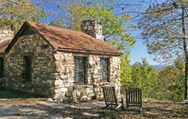
The Civilian Conservation Corps Builds the Franklin Delano State Park in Georgia
Presenter Mr. John E. Croom
The Chattahoochee Valley Historical Society would once again like to extend an open invitation to the general public to attend one of our fine quarterly presentations on Sunday, October 24th at 3:00 PM EST (2:00 PM CDT). Our presentation will be a live, on-site presentation held at Point University’s main campus, the Lanier Academic Center, in downtown West Point, GA.
Our presenter for this upcoming meeting will be John E. Croom. Mr. Croom’s presentation will focus on the Civilian Conservation Corps, a “New Deal”-era program designed by the Roosevelt Administration to provide employment to unmarried young men during the later years of the Great Depression. As many know, the CCC was responsible for many of the state and national parks we frequent and enjoy in Georgia and Alabama. The legacy of their workmanship can be seen in many places that Valley-area residents have probably frequented, such as Chewacla State Park in Auburn, AL or the “Bunker Tower” at the peak of Mount Cheaha (Alabama’s highest point). Most familiar of all of the CCC’s many work projects, however, is likely Franklin D. Roosevelt State Park (formerly “Pine Mountain State Park”) in Harris and Meriwether Counties in Georgia. The CCC’s involvement and contributions to FDR State Park in Georgia will be the specific focus of Mr. Croom’s presentation.
Franklin D. Roosevelt State Park is currently a Georgia State Park. The park is named after the former President because he spent much of his Presidency in Warm Springs, GA in a location now known as the “Little White House” (where a Federally run museum now sits giving a fascinating insight into his life). Because Roosevelt suffered from polio for most of his life, he came here to frequently visit the eponymous springs in Warm Springs, GA (whose waters were always at a constant 88 degrees F, ideal for those with polio and similar infirmities). The park consists of a main area centered around “Lake Delanor”, a lake named for both the President (his middle name being “Delano”) and his wife Eleanor. The park also contains the “Pine Mountain Trail”, a network of hiking trails that extend from the “Country Store” adjacent to Callaway Gardens all the way to the Georgia Public Television broadcast tower just south of Warm Springs, GA in Meriwether County. Other noteworthy locations within the park grounds itself include Dowdell’s Knob (the highest point on Pine Mountain) and “Cascade Falls”, a waterfall located just south of Warm Springs. All throughout the park today, there are vestiges of the CCC’s work (bridges, roads, and former fishery ponds now found on the “Mountain Creek Trail” south of Lake Delanor).
Our presenter Mr. Croom has long been affiliated with the Park itself, and has given many presentations there on the history of the CCC and its contributions to the park. He has also done the same for the “Little White House” Museum in nearby Warm Springs, making him an expert on the Roosevelt Administration’s connection to this area (in addition to the workings and doings of the CCC). His presentation for Sunday, October 24th will consist of four parts: the Depression’s impact in Georgia prior to 1933, the creation of the CCC, its local impact in Georgia (primarily in the Park), and its legacy today.
John E. Croom is a native of Columbus, GA, graduating from Columbus High School in 1973. He graduated from Columbus College (now CSU) in 1977, obtaining a B.A. in Fine Art. He would later graduate from the University of Montevallo in 2003 with a Masters in History, receiving several accolades including History Student of the Year and induction into the Phi Alpha Theta History Honor Society, both in 2003. Following his Graduate studies, he then became a history teacher in Oak Mountain, AL south of Birmingham. During his teaching career, he received the “teacher of the year” award at both Oak Mountain Middle School and Oak Mountain High School. He has been married to Sally McCamy Croom since 1981 and was also involved with the Boy Scouts of America (being on the Volunteer Boy Scouts of America Birmingham Council from 1992 to 2014). He is currently writing a book on the history of the CCC in the Pine Mountain Area from 1933 to 1942, and much of that research will be featured in his presentation.
This presentation will be held at Point University in West Point, GA (address: 507 W 10th Street, West Point, GA, 31833). Visitors are encouraged to park in the west parking lot and enter through the western entrance to the building (several CVHS members will be there to help them find their way to the presentation room). The presentation will start at 3:00 PM Eastern (2:00 PM Central) on Sunday, October 24th and will last approximately one hour (with time for questions at the end). If anyone has any questions concerning our presentation, please email our Program Chair Charlie Powers at ccpowers02@gmail.com for further information.
If you are unable to physically attend the meeting please join us at Chattahoochee Valley Historical Society on Facebook to view the meeting.
- Summer 2021 Quarterly Meeting
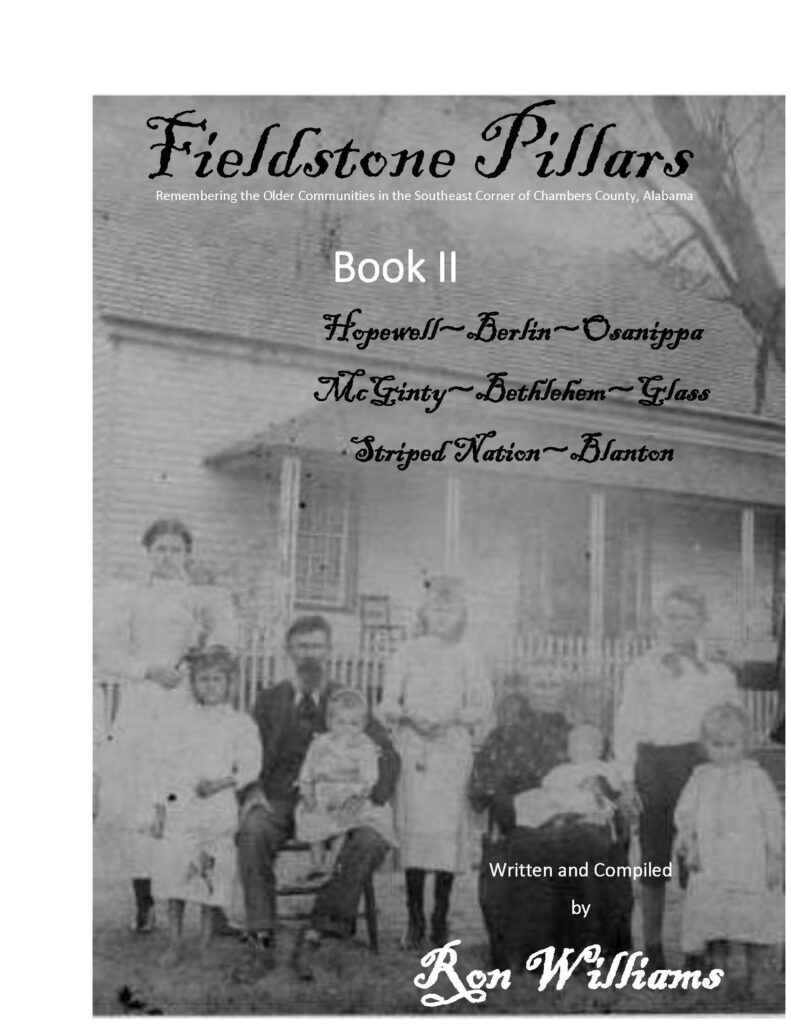
Ron Williams, Historian and Author
By Program Chair, Charles Powers
The Chattahoochee Valley Historical Society would like to extend a warm welcome to the public to attend our quarterly meeting on Sunday, July 25th, at 2:00 PM Central (3:00 PM Eastern). Our presenter will be Ron Williams, a Valley area historian and author of several noteworthy books. His presentation will be on an early settler to the Valley area John Parnell and prominent members of his family.
Unlike our previous three quarterly meetings, which were virtual on ZOOM, this will be our first “in-seat” meeting since January of 2020. Unfortunately, we will not be meeting in the Bradshaw Library as we have in the past. For this meeting, Point University in West Point, Georgia. was gracious to offer to us the use of one of their upstairs classrooms in their Academic Center in downtown West Point. The Academic Center is located in the building that once housed the corporate office of West Point Home, and its address is 507 W 10th Street, West Point. In order to find the classroom in question, we are asking that you please park on the western side of the building (with a student parking lot immediately across the street, in which you can also park if need be). The western door will be open for you and you will be directed upstairs to Room 219. If anyone is unable to use the stairs, there is an elevator directly across from the door you will be entering.
Ron Williams’ topic for Sunday, July 25th, will be John Howard Parnell, the famed peach grower, who came to Chambers County after the Civil War. Parnell, an Irishman, is said to have started the first commercial peach orchard in America, and to be the father of the Georgia peach. Neither claim is true but he certainly is an interesting character in local history.
While living in Chambers County, John was visited by his brother, Charles Stewart Parnell, known as the “uncrowned King of Ireland.” Charles Stewart Parnell was an Irish nationalist politician who
served as a Member of Parliament (MP) from 1875 to 1891, also acting as Leader of the Home Rule League from 1880 to 1882 and then Leader of the Irish Parliamentary Party from 1882 to 1891. His party held the balance of power in the House of Commons during the Home Rule debates of 1885–1886.
Prior to the Charles’ political fame, he visited his brother John in the Valley in 1872. He pondered remaining here and growing peaches. It was said that in Chambers County the future of Ireland hung in the balances. Charles did return to Ireland and became world famous. At our meeting, Ron will discuss Charles’ visit and his comical interactions with the “common American people” of Chambers County. Charles did not think John should be on such familiar terms with the locals or their pigs, according to one story. Ron will also describe other members of the Parnell family. Did you know that John H. Parnell’s mother was American and the daughter of Admiral Charles Stewart, the famed captain of the USS Constitution, known as Old Ironsides? Or that the Parnell’s mother lived as practically a pauper in her old age? We will also discuss the affair that led to Charles Stewart Parnell’s fall from grace.
Charles Stewart Parnell died in 1891 and John sold the Peach Farm and returned to Ireland bringing an end to an interesting commercial venture in Chambers County, Alabama.
The presenter, Ron Williams, grew up in the old Williams Homeplace on Hopewell Road in the southeast corner of Chambers County, Alabama. He is descended from Chambers County pioneers and his children are the 8th generation of his family to call Chambers County home. He currently lives in Valley with his wife, Jennifer, and two sons, Aaron and Kaden. His oldest daughter, Aubrey, lives in Auburn. Growing up in the Old Williams Homeplace fostered his love for family and local history. This old home was built by his 3rd great grandparents, David S. and Nancy Woodall Williams in 1839.
Ron has written and compiled the following books on Chambers County history: When the Dinner Bell Rang: A History of the Hopewell Community, On Railroad Street: The Story of Carrie Hanson Breedlove and her Family, Past Times, which is a collection of historical articles about East Alabama and West Georgia, and Fieldstone Pillars: Remembering the Older Communities in the Southeast Corner of Chambers County, Alabama. Additionally, he has assisted in compiling Aaron Williams and his Descendants, detailing the descendants of this Chambers County pioneer.
If anyone is interested in further information, please contact me at ccpowers02@point.edu for more information.
Remember that this is an in-person meeting and will be held at Point University, Academic Center Room 219. (This is the old West Point Home building.) Parking on the Western side of the building is best as the door you should enter is on that side.
Please plan to attend this wonderful program, which is also our first in-person meeting since January of 2020!
- Spring 2021 Quarterly Meeting
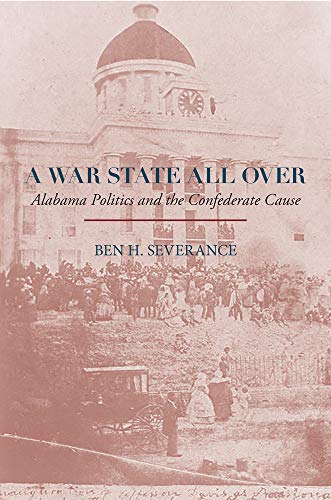
A War State All Over – A Virtual Presentation
By Dr. Ben H. Severance
The public is invited to a presentation and discussion on the impact of the Civil War on the Civilian and Political attitudes in the State of Alabama by Dr. Ben Severance, Professor of History at Auburn University Montgomery, on Sunday, April 25th at 3:00 PM EDT (2:00 CDT). This public discussion will be held online (since the Bradshaw Library still is not yet available for presentations) via ZOOM. All attendees, both CVHS members and the general public, will need to send an active email address to the following address by 12:00 noon (EDT) on that Sunday, April 25th: programs@cvhistoricalsociety.org . The moderator (Charles Powers) will respond to each email with specific directions on how to connect prior to the 3:00 PM meeting.
Dr. Ben H. Severance is a professor of history at Auburn University Montgomery, an institution he joined as a faculty member in 2005. He received his Ph.D. in 2002 from the University of Tennessee (Knoxville). His principal areas of research and teaching include the American Civil War and American Military History more broadly. Among his publications are three books: Tennessee’s Radical Army: The State Guard and Its Role in Reconstruction, 1867-1869 (University of Tennessee Press, 2005), Portraits of Conflict: A Photographic History of Alabama during the Civil War (University of Arkansas Press, 2012), and A War State All Over: Alabama Politics and the Confederate Cause (University of Alabama Press, 2020). In addition to his academic career, he was also an officer in the United States Army before pursuing his PhD.
The focus of Severance’s book A War State All Over is a detailed study of Alabama’s political allegiance to the Confederacy. His research for this project is oriented around the important mid-war elections of 1863, which serve as a crucial gauge of popular support for the Confederate war effort. Severance argues that a strong majority of Alabama’s political leaders remained steadfast to the cause of southern independence right to the end of the war. In doing so, his book illuminates the often-overlooked lives of Alabama’s wartime governors, Congressmen, and state legislators.
The University of Alabama Press review of Dr. Severance’s states, “Alabama’s military forces were fierce and dedicated combatants for the Confederate cause. In his study of Alabama during the Civil War, Ben H. Severance argues that Alabama’s electoral and political attitudes were, in their own way, just as unified in their support for the cause of southern independence. To be sure, the civilian populace often expressed unease about the conflict, as did a good many of Alabama’s legislators, but the majority of government officials and military personnel displayed pronounced Confederate loyalty and a consistent willingness to accept a total war approach in pursuit of their new nation’s aims. As Severance puts it, Alabama was a “war state all over.”
Please encourage all to join this insightful presentation on our state history! - Winter 2021 Quarterly Meeting
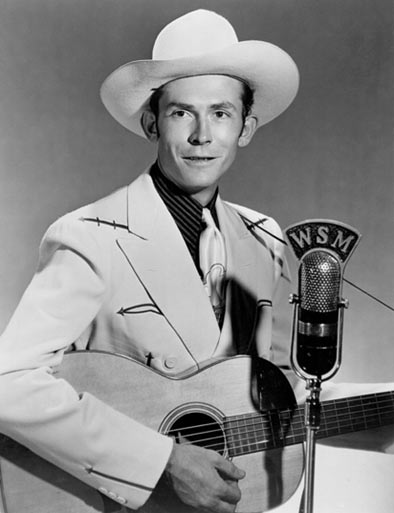
Hank Williams I’ll Never Get Out of This World Alive: The Life of Hank Williams
By Dr. Steve Goodson
The Chattahoochee Valley Historical Society welcomes its membership and the public to a presentation by Dr. Steve Goodson on the life and cultural impact of country icon and Alabama native Hank Williams on Sunday, January 24th at 3:00 PM EST (2:00 PM CST). This public presentation will be held online (due to the ongoing pandemic) via ZOOM. All attendees, both CVHS members and the general public, will need to send an active email address to the following address by 12:00 noon EST on that Sunday, January 24th, 2021: programs@cvhistoricalsociety.org. The moderator (Charles Powers) will respond to each email with specific directions on how to connect prior to the 3:00 PM meeting.
Steve Goodson was born in Montgomery, Alabama, and grew up in nearby Prattville. He received his B.A. in History from Auburn University at Montgomery in 1988, and earned his Ph. D in History from Emory University 1995. He has been teaching at the University of West Georgia in Carrollton, Georgia, since 1996, having served as the Chairperson of the History Department from 2006 until 2018. Dr. Goodson became an avid fan of Hank Williams in his childhood; both his father and his brothers had attended many of Williams’ performances in person. Like the musician himself, Goodson also considers Montgomery his hometown and has a special fondness for the city and its culture and people. Steve’s father also had a personal collection of 78 rpm Hank Williams records that both he and his brothers would listen to frequently.
While still a senior at the Auburn University at Montgomery in 1998, Steve, along with his brother Gary, gave his first presentation on the life and legacy of Hank Williams. Many in attendance were so impressed that word soon spread to other colleges and universities in Alabama, and Steve and his brother were soon invited to give a similar presentation at Jacksonville State University. While he was still a graduate student, Steve contributed an article on Hank Williams to the Alabama Review, which was well-received and further established him as an expert on the country music legend. He continued to lecture and speak on Williams’ legacy throughout his graduate and post-graduate studies (and he has continued as a Professor at the University of West Georgia). He has authored a book entitled Highbrows, Hillbillies, and Hellfire: Public Entertainment in Atlanta, 1880-1930, published by the University of Georgia Press. Published in 2002, this book received the Georgia Historical Society’s Bell Award for best publication published that year. In 2014, Goodson became the co-editor of The Hank Williams Reader, published by Oxford University Press.
Goodson’s enthusiasm for the life and legacy of Hank Williams comes from his long-standing belief that the Southeastern United States has a rich history of artists, media personalities, and others who are often overlooked or otherwise not properly understood by the general public. He believes that the life journey of Hank Williams to country music stardom was a complex and richly detailed journey that encompasses many interesting details on life in rural Alabama in the early and mid 20th century. He has often noted the influence of African-American blues musicians on Williams’ artistry and career as an example of this complex cultural history that is often overlooked by the general public.
This online meeting will be the first of our four quarterly meetings in 2021. The Chattahoochee Valley Historical Society has been in continuous operation since its founding in 1953. It is a membership-based organization with members from across the United States. The CVHS also has membership in both the Georgia Historical Society and the Alabama Historical Society. Each summer the CVHS leads a 5-6 day “bus tour” to various historical sites throughout the Southeastern United States departing from and eventually returning to Valley, Alabama. These trips have visited many prominent sites from the American Civil War, and the next upcoming bus trip (scheduled for June of 2021 if the COVID situation improves) will focus exclusively on the Muscogee (Creek) Indians and their prominent historical sites in the state of Alabama.
To learn more about the Chattahoochee Valley Historical Society, follow or “like” our Facebook page.
- Fall 2020 Quarterly Meeting

A Book Talk: Lafayette in Alabama—Which Way Did He Go? And Which Way Did He Not?
By Dr. Lawrence Krumenaker
The public is invited to a book talk by Dr. Lawrence Krumenaker, author of Nine Days Traveling: Lafayette’s 1825 Alabama Tour, Today’s Historical Road Trip, on Sunday, October 25, 2020, at 3:00 EST. Due to the pandemic the meeting will be hosted on Zoom; registering is explained at bottom of page.
In 1824, President James Monroe invited the last surviving General from the Revolutionary War, the French-born Marquis de Lafayette, to return to the United States to help celebrate the 50th anniversary of the Revolution. Among the 24 states Lafayette visited in his year long journey was Alabama. He spent nine days traveling from the Chattahoochee River, through Creek Indian Nation along the Federal Road to Montgomery, then down the Alabama River via steamboat, finally arriving at Mobile and the Gulf Coast fort at Mobile Point. But where exactly did he go? How can we separate facts from multiple legends and folklore? What is there to see of his stops and route today in East Alabama? And which sites claimed for his visit…aren’t true?
The book Nine Days Traveling traces Lafayette’s path across the state from the fragmentary first-hand accounts and later researcher’s notes, and separates fact from myriad local legends. If after 200 years Lafayette came back and traveled the route again, what would he see? What would be different? What would be the same? And how would you travel the route today? Ultimately, 37 sites were found where the Marquis ate, slept, talked, was talked to, witnessed an event, did something or stopped at, which Dr. Krumenaker photographed and marked on modern maps. Krumenaker proposes five walking trails in different cities that should be marked for Lafayette’s Tour bicentennial in 2025. In addition to a general discussion of the recovered route and sites, the nearest locations to Valley, Al, will be described.
Dr. Lawrence Krumenaker is both a global and academic wanderer. Though currently a Macon County resident, he has lived and traveled in many states and numerous countries as his interests have taken him around the world. Dr. Krumenaker began his professional life as an astronomer with research in stellar spectroscopy and planetary cartography and is the discoverer of the brightest and first known micro-quasar. He often teaches in the sciences and astronomy education. He has taught at such diverse places as Jackson State University in Mississippi, Seoul University in Korea, and the University of Cologne in Germany. Over the past two decades, he has become a world renowned science journalist, including being the president of the International Science Writers Association, and before coming to Alabama was Journalist-in-Residence at the Heidelberg (Germany) Institute for Theoretical Studies. Dr. Krumenaker has published six books, three of which are historical tourism books.
If you wish to purchase Nine Days Traveling please go to Dr. Krumenaker’s website www.hermograph.com/lafayette. He offers 10 percent off the price of $26.95 if you use the code CVHS20 through this website and order online through October 24th. You may also be interested in other historical publications and items advertised at his www.hermograph.com website. The t shirt which tells time as a sundial is very interesting.
CVHS makes history by hosting its first virtual program on Sunday October 25, 2020 at 3:00 EDT.
On Sunday October 25th Charlie Powers will moderate the Zoom video conference. Attendees, CVHS membership and general public, are requested to initiate attending this virtual meeting (via Zoom on the internet) by sending your email address to: programs@cvhistoricalsociety.org – Please send your email address before 12:00 noon on that Sunday (Oct 25th). The moderator will respond to each email with directions of how to connect prior to the 3:00PM meeting. It is best to join-in and be ready about 3 or 4 minutes before the meeting begins. You will simply be “on-hold” until it is time to begin.
- Summer 2020 Quarterly Meeting
West Point on the Chattahoochee: How It All Began
On Sunday, July 26, at 3:00 pm EDT, the Chattahoochee Valley Historical Society will present its summer quarterly program on the development of the city of West Point along the banks of the Chattahoochee River. The outdoor public gathering will be held at the large covered pavilion that is located next to West Point City Hall and, appropriately enough, alongside the river.
Henry Jacobs, Middle Chattahoochee Director for the Chattahoochee Riverkeeper(CRK), will discuss the natural history of the river, particularly the benefits and challenges of the Fall Line geography that defines West Point and the Greater Valley Area. Jacobs will also examine the most significant tributaries in our region, including Oseligee Creek, Tanyard Creek, Moore’s Creek, and Osanippa Creek, and talk about recent efforts by CRK to address issues concerning the health of the local watershed including sediment erosion and the proposed removal of Langdale and Riverview Dams.
CVHS President Malinda Powers will provide additional commentary about the history of settlement at this western-most point of the Chattahoochee. Originally, these lands were settled by the Creek Indians, who were still living on the west bank at the time Troup County was organized in the 1820’s. Powers will address the influence of the Chattahoochee River on the early development of the city and examine the effects of major flooding in the 19th and 20th centuries.
“As always, our public programs are free. The general public is invited to enjoy Henry Jacobs presentation. One of our Society’s publications contains a wonderful history of West Point that was written in 1876 and delivered on the occasion of the nation’s centennial celebration. We will have copies of Proudest Inheritance for sale at our program for $10 each,” says Powers. “We encourage those interested in local history to attend. For more information about our organization, go to www.cvhistoricalsociety.org.”
- Spring 2020 Quarterly Meeting
This meeting was cancelled due to the pandemic.
- Winter 2020 Quarterly Meeting
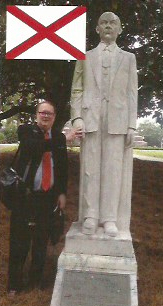
Alabamian Jim Patterson with Albert Patterson in Montgomery How the Family History of a Boy from Fairfax Intersected with the Civil Rights Struggle in Alabama and the Making of a Movie Presented by Jim Patterson, United States Diplomatic Service
Writer/speaker Jim Patterson has many interesting stories to tell ranging from describing boyhood in an Alabama textile mill village, to traveling worldwide as an economics and political officer of the United States Diplomatic Corp, to being an actor in a movie which portrayed his father’s role in the Alabama National Guard during the Civil Rights struggle in Alabama. Ever mindful of public service by members of the Patterson family, Jim was motivated to a career in public service and now is inspired to describe his family’s historical intersection with the Civil Rights struggle in Alabama. His father James Glover Patterson (b.1933 d.2003) served in the nationalized Alabama National Guard during three significant historical events: the Cuban Missile Crisis, the integration of the University of Alabama, and the Selma March. Jim’s interesting family story animated him to seek to re-enact his father’s roll as a National Guardsman during the Selma March in the making of a movie. He will describe his father’s nationalized guard duty in the 1960’s and how those experiences affected the Patterson family and Jim’s values. In an attempt to memorialize his father’s public service in the Alabama National Guard, Jim describes his effort to project himself into commercial film making, into acting in the award-winning film, Selma. Although Jim has lived away from the Valley and Alabama since he finished his education, he acknowledges that he has lost his southern accent, but his core values have always been rooted here in the Valley and Patterson family history.
Jim Patterson was reared in the Valley town of Fairfax, graduating in 1973 from Valley High School and later from Auburn University. Following university, he moved to Washington, D. C., where he began his career as a Foreign Service Officer at the United States Department of State. Jim has served as a US Diplomat in Mexico, United Kingdom, Brazil, Canada, Chile, France and the Netherlands. He is currently stationed in Washington, D.C. He is a contributor to The Foreign Service Journal, The Hill and other publications. His graduate education includes continuing studies at Georgetown University, the Graduate School, U.S. Department of Agriculture, and the Foreign Service Institute.
Jim enjoys public speaking on US foreign affairs, family history and on his life experiences. He is a member of the Sons of the American Legion, Associate Member of the Korean War Veterans Association, Life Associate Member of the Vietnam Veterans Association, The US Philippine Society, Friends of Israeli Defense Forces, Donor/Member of Helen Keller International, Life Member of the American Foreign Service Association. He is a member of the Auburn University Alumni Association, Alabama’s State Society, and the Chattahoochee Valley Historical Society. He is a formerly elected official in Indianapolis, Indiana, and in Washington, D. C.
- Fall 2019 Quarterly Meeting
A Mill Village Story Presented by Gerald Bruce Andrews
The Chattahoochee Valley Historical Society is happy to announce that Mr. Gerald Bruce Andrews will be the speaker at the October General Membership Meeting on Sunday, October 27, 2019, 3:00 EST in the Lanier Room, The Chambers County Bradshaw Library, Valley, Alabama. Mr. Andrews will review his recent book which is descriptive of growing up in the mill villages and working in the mills of the Chattahoochee Valley. His book is biographical and his story’s setting is the village with its mill and the many working people of good character in that past era.
The publisher, New South Books, describes: “A Mill Village Story is the record of one man’s upbringing in a place and time that is quickly vanishing. A quintessentially American small town, West Point, Georgia is a place defined by its local industry—a world-class textile mill run by the WestPoint-Pepperell Corporation—and adherence to traditional Southern values of congeniality, manners, and friendliness. Everyone author Gerald Andrews knew or even just rubbed shoulders with worked at the mill, and it was Andrews’ experiences there that would take him from relative poverty to the corporate boardroom. A Mill Village Story is an account of Andrews’ early years, his rapid rise to leadership in various textile firms, and the special character of the village that shaped him.
How does a young man go from night watchman to corporate sales in a matter of years? A Mill Village Story offers some explanation. Creativity and kindness set him on the right path, those characteristics nurtured in him by family members and the mill community. Gerald Andrews also quickly gained a reputation as a problem-solver—even at the lowest position at the mill—and for recognizing the importance of every employee, no matter their rank. This compassion for his employees contributed to his success. In A Mill Village Story, a lifetime of wisdom comes to file, with Andrews peppering his tale with the homegrown philosophies he developed from the unique social relationships he enjoyed growing up. Add to the mix personal encounters with Southern characters like country psychic Mayhayley Lancaster and A Mill Village Story becomes a memorable time capsule that serves as a portrait of a uniquely American place.
Gerald Andrews grew up in a small Southern mill village. He attended Auburn University and Harvard Business School, and has received over eighty honors and awards in praise of his creative brand of leadership. He has served as Corporate Executive Vice President of West Point Stevens, Inc. in New York; President and CEO of Johnston Industries; CEO and Chairman of Accelegrow Technologies; and Executive-in- Residence at Auburn University. A Mill Village Story is his first book.”
Members of the general public and members of the Chattahoochee Valley Historical Society are invited to attend the presentation by Mr. Andrews in the Lanier Room, Bradshaw Library, Valley, Alabama, Sunday, October 27, 2019, at 3:00 EDT. - Summer 2019 Quarterly Meeting
Thank you, Mr. Rosenwald
Presented by Susan Webb, historical interpreterThe Chattahoochee Valley Historical Society is happy to announce that Ms. Susan Webb will be the speaker at this month’s general membership meeting. Using photographs, documented interviews, historical artifacts, audience participation of authentic recitation lessons and tales of early American education, America’s Traveling Schoolmarm will transport you to the legacy of Julius Rosenwald and the schools he helped build in the back roads of Alabama. Julius Rosenwald, the early 20th-century president of Sears, Roebuck and Company, was a German-Jewish immigrant, philanthropist and trustee of Tuskegee Institute. From 1912 until 1932, his generous caring and compassion for the education of 663,615 African-American children helped blanket 15 Southern states with over 5,300 school buildings, 407 of which were built in Alabama. His collaboration with Booker T. Washington, Tuskegee Institute, and grassroots community efforts resulted in a program which constructed schoolhouses, teacher homes and industrial high schools across the South. By 1928, one in every five African-American rural schools in the South was a Rosenwald school. Makeshift classrooms in run-down shanties and dusty church basements were replaced with well-constructed and carefully planned Rosenwald school buildings. Today, through the efforts of local residents, the National Trust of Historic Preservation, and generous corporate contributions, many Rosenwald schools are being restored in southern communities, including Notasulga, Greensboro, Midway, and Fredonia, Alabama.
Susan Webb, early American school historian, has become America’s Traveling Schoolmarm. Having lived in areas of the country steeped in the history of country schooling, Susan has developed a passion for the study of American education. Her 20 years as a classroom teacher, her background in theatrical presentation, and over a decade of early-American education research prompted her to develop her entertaining and unique, yet informative, programs. These ventures have transported her to libraries, universities, conference sites, historical societies and museums across the United States. From these journeys she has collected a small library of antique schoolbooks and an array of historical school artifacts. Susan has set foot in countless historically restored country schools throughout the country to engage audiences in school reenactments, utilizing her book Country School Copybook and other publications she has written: Ready for Reenactment?, School Days Lessons, Masterful McGuffey, and My One-Room School Copybook.
Members of the Chattahoochee Valley Historical Society and the general public are invited to attend the program in the Fredonia Community Center (formerly the Fredonia School House) in Fredonia, Alabama, Sunday July 28, 2019, 3:00 p.m. EDT. - Spring 2019 Quarterly Meeting
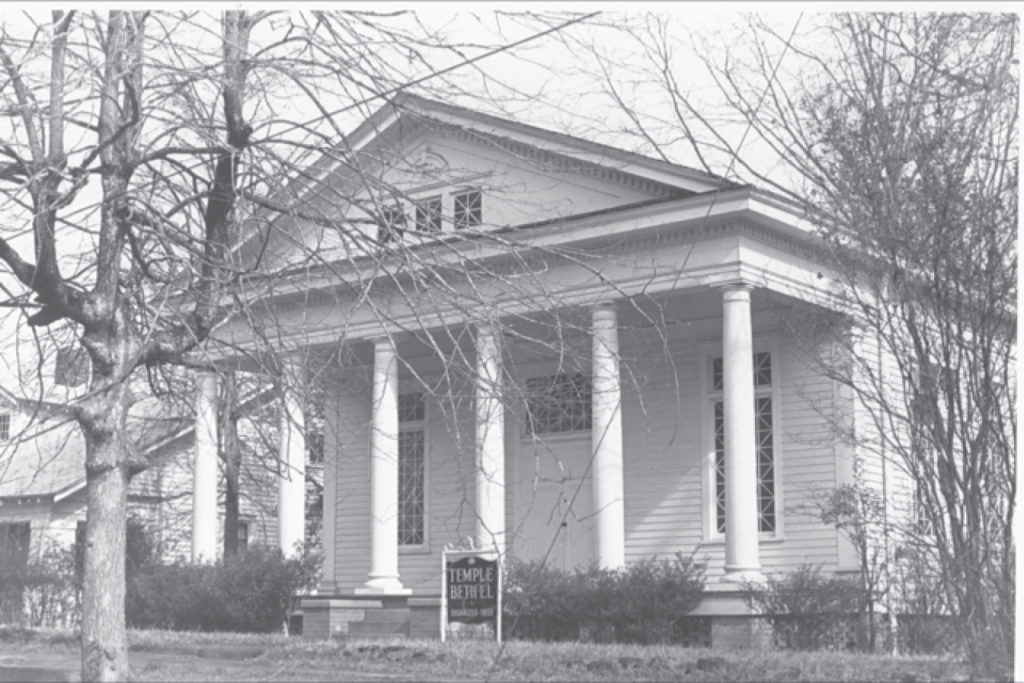
Temple Bethel, built in 1909 served the members of the Valley Jewish Community who primarily lived in the West Point-Bluffton residential area. The Temple was closed in 1963, purchased by a real-estate company in 1977, and later demolished. When young Louis Merz arrived in Philadelphia, he quickly found his way to the residence of cousin Sam Cohen, a fellow Jewish emigrant from Bavaria. Cohen introduced his kinsman to another boarder in the house, Heyman Heyman from Prussia. These three young men were part of a tight-knit band of Jewish immigrants who had come to America’s “City of Brotherly Love” to escape antisemitism in Europe and pursue the American dream. After a year of working in the city’s mercantile trade, Heyman and Merz headed south, eventually opening a dry goods store in West Point, Georgia, in 1854.
Over the years, friends and relatives followed and became an integral part of West Point’s business community and social life. Several of these families- Heyman, Merz, Hagedorn, and others- lived in “Bluffton”, the Alabama heights overlooking the growing city of West Point. By 1859, they had established a Jewish congregation and held religious services in each other’s homes until a temple was constructed in 1909 in “Grandma Heyman’s (former) garden”.
Their stories are the focus of the quarterly program of the Chattahoochee Valley Historical Society on Sunday, April 28, at 3:00 pm EDT. History educators Malinda and Charles Powers will serve as presenters. While the former specializes in American and Alabama history, Charles is a university instructor with a concentration in European and American history. Mr. Powers will highlight the plight of the 19th-century Jews living in Prussia and Bavaria, lands which would later become part of the nation of Germany. In addition, he will examine their emigration to U.S. cities such as Philadelphia. A power-point presentation will include a variety of old photographs.
In 1959, the centennial anniversary of the founding of Temple Beth-eL, Miss Fannie Herzberg presented a paper she had written on its history and pioneer members to our historical society. Miss Herzberg, a resident of West Point, was a granddaughter of Heyman (later “Herman”) and Betty Heyman. At the close of her presentation, she stunned the crowd with her donation of the Confederate diary of her great uncle, Louis Merz. This diary was transcribed, and both Miss Herzberg’s address and the contents of Merz’s diary were published as CVHS Bulletin #4 later that year. The diary was then placed in a security vault for safe-keeping.
For the first time in 60 years, this diary will be on public display at our upcoming quarterly meeting. What a unique opportunity for those interested in local or Civil War history to view this important artifact! The program will be held at the H. Grady Bradshaw Library in Valley, Alabama, and is open to the public. For directions, please check our website at www.cvhistoricalsociety.org.
- Winter 2019 Quarterly Meeting
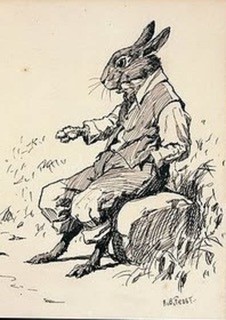
An early illustration of Br’er Rabbit The Chattahoochee Valley Historical Society will host its winter quarterly program on Sunday, January 27, at 3:00 pm ET, at the Bradshaw Library in Valley. Guest speaker for the event will be author Julie Hedgepeth Williams, a journalism professor at Samford University with a specialty in media history. Williams has recently penned a new book, and will be speaking about its historical backdrop at the program.
According to her publisher, Williams will be speaking from her research and writings on interactions in the lives of three men and how their serendipitous interactions culminated in the creation and publication of the Uncle Remus stories. The three men, Joseph Addison, Joseph Addison Turner, and Joel Chandler Harris are creatively described in her new book, Three Not -So-Ordinary Joes: A Plantation Newspaperman, a Printer’s Devil, an English Wit, and the Founding of Southern Literature, published this year by New South Books.
The author describes her presentation as “story-telling based”. She even incorporates audience volunteers as participants in several skits based on the Uncle Remus stories.
Julie Williams is also the author of A Rare Titanic Family, winner of the 2014 Ella Dickey Literacy Award, and Wings of Opportunity: The Wright Brothers in Montgomery, Alabama, 1910. She will have copies of all three of her books for sale at Sunday’s program.
The general public is invited to this program of the Chattahoochee Valley Historical Society and to enjoy Dr. Julie Williams’s presentation.
Fall 2018
Dr. Bohannon, Professor in the History Department at the University of West Georgia, Carrollton, GA will describe the history of the Georgia Military Institute and how its history and cadets are connected to our local history in the Chattahoochee Valley.
Summer 2018
Preserving word-of-mouth stories. The CVHS on July 15, will present members and friends an opportunity to share the storytelling experience which our families sought and enjoyed in the past. We will arrange the seating in a square as if we were at a Sacred Harp singing in order to make our experience more intimate. Storytellers will speak from their seats. We will also video this program and save your story.
Spring 2018
Dr. Horace (Mac) McLean Holderfield, Vice President for Editing The Voice,
in a power point program will present historical maps and other visuals
which portray the physical history of the area which became Chambers
County.
Winter 2018
